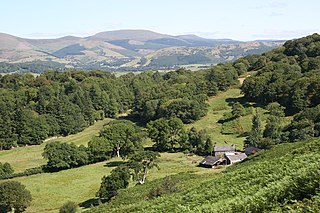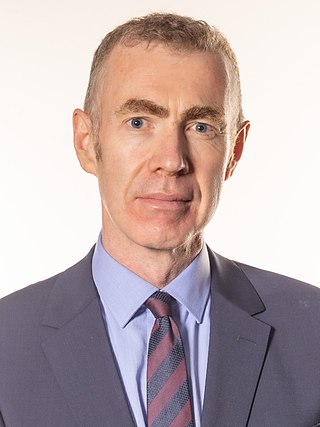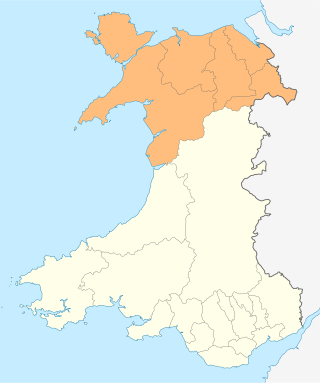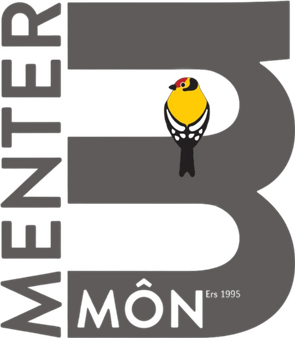
Gwynedd is a county in the north-west of Wales. It borders Anglesey across the Menai Strait to the north, Conwy, Denbighshire, and Powys to the east, Ceredigion over the Dyfi estuary to the south, and the Irish Sea to the west. The city of Bangor is the largest settlement, and the administrative centre is Caernarfon. The preserved county of Gwynedd, which is used for ceremonial purposes, includes the Isle of Anglesey.
Plaid Cymru is a centre-left to left-wing, Welsh nationalist political party in Wales, committed to Welsh independence from the United Kingdom.

Ceredigion ( ), historically Cardiganshire, is a county in the west of Wales. It borders Gwynedd across the Dyfi estuary to the north, Powys to the east, Carmarthenshire and Pembrokeshire to the south, and the Irish Sea to the west. Aberystwyth is the largest settlement and, together with Aberaeron, is an administrative centre of Ceredigion County Council.

Adam Robert Price is a Welsh politician who served as Leader of Plaid Cymru from September 2018 to May 2023. He has been the Member of the Senedd (MS) for Carmarthen East and Dinefwr since 2016, having previously been a Member of Parliament (MP) for the same Westminster constituency from 2001 to 2010.

Ieuan Wyn Jones is a Welsh politician who was the Deputy First Minister in the Welsh Government from 2007 to 2011. He was the Member of the National Assembly for Wales for the Ynys Môn constituency from 1999 to 2013, and he was also leader of Plaid Cymru from 2000 to 2012. Jones served as Member of Parliament for Ynys Môn constituency from 1987 to 2001, when he retired to focus on his work in the Welsh Assembly. In 2007, Jones was named Wales' "Politician of the Year" by the BBC Wales am.pm programme. He resigned from the Welsh Assembly on 20 June 2013. In 2017 he unsuccessfully sought to return to the House of Commons for his former constituency.

North Wales is a region of Wales, encompassing its northernmost areas. It borders mid Wales to the south, England to the east, and the Irish Sea to the north and west. The area is highly mountainous and rural, with Snowdonia National Park and the Clwydian Range and Dee Valley, known for its mountains, waterfalls and trails, wholly within the region. Its population is concentrated in the north-east and northern coastal areas, with significant Welsh-speaking populations in its western and rural areas. North Wales is imprecisely defined, lacking any exact definition or administrative structure. It is commonly defined administratively as its six most northern principal areas, but other definitions exist, with Montgomeryshire historically considered to be part of the region.

Gwynedd Council, which calls itself by its Welsh name Cyngor Gwynedd, is the governing body for the county of Gwynedd, one of the principal areas of Wales. The council administrates internally using the Welsh language.

Y Fro Gymraeg is a name often used to refer to the linguistic area in Wales where the Welsh language is used by the majority or a large part of the population; it is the heartland of the Welsh language and comparable in that respect to the Gàidhealtachd of Scotland and Gaeltacht of Ireland. It has no official government recognition.
Menter Iaith is a community-based organisation which works to raise the profile of the Welsh language in a specific area. Each local Menter Iaith receives a basic grant from the Welsh Language Board, as well as financial support from a number of other sources, to work with individuals, organisations, and local business to promote the use of Welsh in its area.

The following outline is provided as an overview of and topical guide to Wales:

In Wales, a trunk road agent,, is a partnership between two or more county and/or county borough councils for the purposes of managing, maintaining, and improving the network of trunk roads in Wales in their respective areas on behalf of the Welsh Government.

The 2017 Welsh local elections were held on 4 May 2017 to elect members of all 22 local authorities in Wales. This included the Isle of Anglesey, which was previously up for election in 2013 due to having its elections delayed for a year. Community council elections also took place on the same day. These local elections were held as part of the 2017 local elections in the United Kingdom. Apart from Anglesey, the last elections were held in 2012. Normally these elections take place every four years, but the 2017 elections were postponed for a year in order to avoid clashing with the 2016 Welsh Assembly election, which itself had been postponed by a year to avoid clashing with the 2015 general election.

The 2022 Welsh local elections took place on 5 May 2022 to elect members of all twenty-two local authorities in Wales. They were held alongside other local elections in the United Kingdom. The previous elections were held in 2017.

In 2019, Wales generated 27% of its electricity consumption as renewable electricity, an increase from 19% in 2014. The Welsh Government set a target of 70% by 2030. In 2019, Wales was a net exporter of electricity. It produced 27.9 TWh of electricity while only consuming 14.7 TWh. The natural resource base for renewable energy is high by European standards, with the core sources being wind, wave, and tidal. Wales has a long history of renewable energy: in the 1880s, the first house in Wales with electric lighting powered from its own hydro-electric power station was in Plas Tan y Bwlch, Gwynedd. In 1963, the Ffestiniog Power Station was constructed, providing a large scale generation of hydroelectricity, and in November 1973, the Centre for Alternative Technology was opened in Machynlleth.

Wales has traditionally been divided into a number of ambiguous and ill-defined areas described as regions, reflecting historical, geographical, administrative, cultural and electoral boundaries within the country. Presently, the most common form of division of Wales into "regions" has been using cardinal and intercardinal references: north or south-west for example. None of the variously described "regions" have official status or defined boundaries; neither is there a fixed number of regions. Various organisations use different regions and combinations of regions for their individual purposes. This includes devolved institutions, such as Visit Wales, Natural Resources Wales, and the Welsh Government itself, using different sets of Wales' regions. Wales is most commonly sub-divided into between two and four regions, with a North–South divide, and North, Mid, South East and South West division being common. This article lists the various terms applied to be the "regions of Wales" and the regions used by various organisations.

Ambition North Wales is a joint committee and decision-making body overseeing the North Wales Growth Deal, a regional economic growth deal covering the North Wales region. It is a partnership between the six local authorities of Conwy County Borough, Denbighshire, Flintshire, Gwynedd, Isle of Anglesey, and Wrexham County Borough, and other local partners in the region, including Bangor University, Wrexham University, Grŵp Llandrillo Menai, Coleg Cambria, and various private sector representatives.

In December 2021, the Welsh Labour government and Plaid Cymru signed a three-year co-operation agreement, where the two parties agreed to work together in 46 policy areas. The agreement is not a coalition or confidence and supply agreement; Plaid Cymru remain in opposition but can appoint advisers to offices of the Welsh Government.

Menter Môn is a social enterprise organisation, based in Anglesey, Wales. It mainly operates in Anglesey and Gwynedd, although some of its programmes and funds extent to other parts of north and west Wales. Menter Môn focuses on delivering local projects, including those specialising in local regeneration, the environment and culture.
















